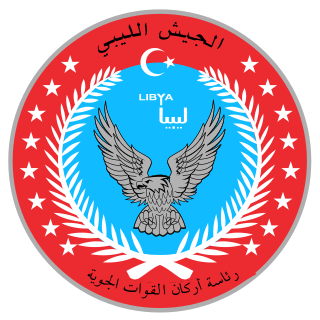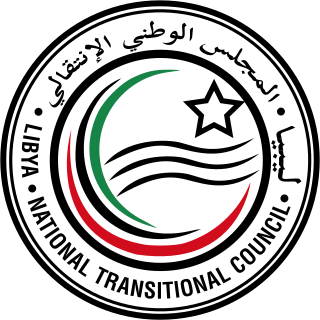This article needs additional citations for verification .(January 2018) |
| |||||
| Decades: | |||||
|---|---|---|---|---|---|
| See also: | Other events of 2014 List of years in Libya | ||||
The following lists events that happened in 2014 in Libya .
This article needs additional citations for verification .(January 2018) |
| |||||
| Decades: | |||||
|---|---|---|---|---|---|
| See also: | Other events of 2014 List of years in Libya | ||||
The following lists events that happened in 2014 in Libya .

The Libyan Air Force is the branch of the Libyan Armed Forces responsible for aerial warfare. In 2010, before the Libyan Civil War, the Libyan Air Force personnel strength was estimated at 18,000, with an inventory of 374 combat-capable aircraft operating from 13 military airbases in Libya. Since the 2011 civil war and the ongoing conflict, multiple factions fighting in Libya have been in possession of military aircraft. As of 2019, the Libyan Air Force is nominally under the control of the internationally recognised Government of National Accord in Tripoli, though the rival Libyan National Army of Marshal Khalifa Haftar also has a significant air force. In 2021, the air force was under command of the new President of Libya, Mohamed al-Menfi that replaced Fayez al-Sarraj.

Abdul Fatah Younis Al-Obeidi was a senior Libyan military officer. He held the rank of major general and the post of minister of interior, but resigned on 22 February 2011 and defected to the rebel side in the First Libyan Civil War. He was considered a key supporter of Muammar Gaddafi or even No. 2 in the Libyan government.

Field Marshal Khalifa Belqasim Omar Haftar is a Libyan politician, military officer, and the commander of the Tobruk-based Libyan National Army (LNA). On 2 March 2015, he was appointed commander of the Armed forces loyal to the elected legislative body, the Libyan House of Representatives.

The aftermath of the 2011 Libyan civil war has been characterized by marked change in the social and political order of Libya after the overthrow and killing of Muammar Gaddafi in the civil war that was fought in Libya in 2011. The country has been subject to ongoing proliferation of weapons, Islamist insurgencies, sectarian violence, and lawlessness, with spillovers affecting neighboring countries, including Mali.

Following the end of the First Libyan Civil War, which overthrew Muammar Gaddafi, there was violence involving various militias and the new state security forces. This violence has escalated into the Second Libyan Civil War (2014–2020).

Ansar al-Sharia in Libya was an Al-Qaeda-aligned Salafi Jihadist militia group that advocated the implementation of Sharia law across Libya. Ansar al-Sharia came into being in 2011, during the Libyan Civil War. Until January 2015, it was led by its "Amir", Muhammad al-Zahawi. As part of its strategy, the organization targeted specific Libyan and American civilians for death and took part in the 2012 Benghazi attack. The group was designated as a terrorist organization by the United Nations, Iraq, Turkey, the United Arab Emirates, the United Kingdom and the United States.

The 2013 Benghazi conflict is a part of the aftermath of the Libyan civil war, that began after clashes erupted between protesters and militants from the Libya Shield brigade on 8 June 2013.

The Libyan Special Forces (LSF), also known as the Al-Saiqa or Saiqa Special Forces and simply Saiqa or Al-Saiqa, are an elite Libyan National Army unit formed from a mixture of paratroopers, paramilitary forces and commandos. Prominent LSF commander Mahmoud al-Werfalli was indicted in 2017 and 2018 by the International Criminal Court for the war crime of murdering and ordering the murders of non-combatants, and was assassinated in 2021.

The Libyan civil war (2014–2020), also known as the Second Libyan Civil War, was a multilateral civil war which was fought in Libya among a number of armed groups, but mainly the House of Representatives (HoR) and the Government of National Accord (GNA), for six years from 2014 to 2020.

The Libya Shield Force is an armed organisation formed in 2012 out of anti-Gaddafi armed groups spread throughout Libya. The Libyan parliament designated much of the Libya Shield Force as terrorist and elements of the Libya Shield Force were identified as linked to al-Qaeda as early as 2012.

Abdullah al-Theni is a Libyan politician who became prime minister of the House of Representatives of Libya on 11 March 2014, when he took over in an interim capacity after the dismissal of Ali Zeidan. He was previously the defence minister in the government of Zeidan.

The Shura Council of Benghazi Revolutionaries was a military coalition in Benghazi, Libya, composed of Islamist and jihadist militias, including Ansar al-Sharia, Libya Shield 1, and several other groups.

The Libyan crisis is the current humanitarian crisis and political-military instability occurring in Libya, beginning with the Arab Spring protests of 2011, which led to two civil wars, foreign military intervention, and the ousting and death of Muammar Gaddafi. The first civil war's aftermath and proliferation of armed groups led to violence and instability across the country, which erupted into renewed civil war in 2014. The second war lasted until October 23, 2020, when all parties agreed to a permanent ceasefire and negotiations.
The Battle of Benghazi was a battle of the Second Libyan Civil War. It was fought in May and July 2014 between the Islamic Shura Council of Benghazi Revolutionaries and the Libyan National Army, and some residents which stood with the army in the city. The Shura Council of Benghazi Revolutionaries led by Ansar al-Sharia (Libya) has been designated as a terrorist organization by the United Nations, Turkey, the United Arab Emirates, the United Kingdom and the United States.

The Government of National Accord was an interim government for Libya that was formed under the terms of the Libyan Political Agreement, a United Nations–led initiative, signed on 17 December 2015. The agreement was unanimously endorsed by the United Nations Security Council, which welcomed the formation of a Presidency Council for Libya and recognized the Government of National Accord as the sole legitimate executive authority in Libya. On 31 December 2015, Chairman of the Libyan House of Representatives, Aguila Saleh Issa declared his support for the Libyan Political Agreement. The General National Congress has criticized the GNA on multiple fronts as biased in favor of its rival parliament the House of Representatives.
This is a detailed timeline of the Libyan civil war (2014–2020) which lasted from 2014 to 2020.

The Battle of Benghazi (2014–2017) was a major battle of the Second Libyan Civil War that raged from October 2014 to December 2017, between the Shura Council of Benghazi Revolutionaries, Islamic State of Iraq and the Levant in Libya, and the Libyan National Army (LNA), and paramilitaries supporting the Libyan National Army in the city. The battle was a direct consequence of the failed Benina Airport Offensive by the Benghazi Revolutionaries and their Allies, which allowed LNA Forces to regroup and attack deep into Benghazi.
Clashes occurred in western Libya since 14 October 2016, when a coup d'état attempt was conducted by the former head of the National Salvation Government (GNS), Khalifa al-Ghawil, against Prime Minister Fayez al-Sarraj, the head of Libya's Government of National Accord (GNA). This evolved into fighting between the GNA and GNS for control of Tripoli and parts of western Libya, while pro-GNA militias also attacked other militias for control of the region.

In late January 2019, the Libyan National Army (LNA) led by Marshal Khalifa Haftar launched an offensive to take control of the city of Sabha and the rest of southern Libya from the internationally recognised Government of National Accord (GNA) and local factions. Officially, the LNA announced that the reason for the operation was to remove terrorists, Chadian rebel groups, and to secure the border, but it has expanded Haftar's territorial control and acquired him oil fields near Sabha. It has also restarted some interethnic conflicts as the LNA has allied with local Arab tribes, while the Tuareg and Toubou tribal militias are loyal to the GNA.

The Western Libya campaign was a military campaign initiated on 4 April 2019 by the Operation Flood of Dignity of the Libyan National Army, which represents the Libyan House of Representatives, to capture the western region of Libya and eventually the capital Tripoli held by the United Nations Security Council-recognised Government of National Accord. The Government of National Accord regained control over all of Tripoli in June 2020 and the LNA forces withdrew from the capital, after fourteen months of fighting.